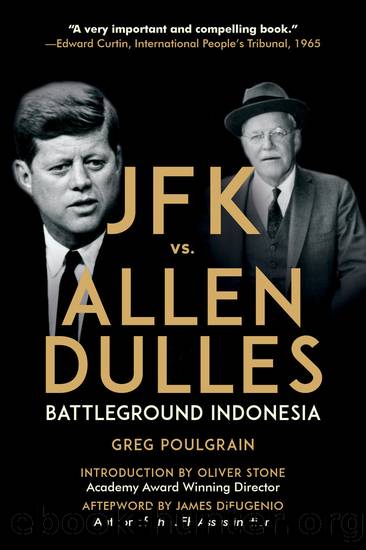JFK vs. Allen Dulles by Greg Poulgrain

Author:Greg Poulgrain
Language: eng
Format: epub
ISBN: 9781510744806
Publisher: Skyhorse
Published: 2020-08-20T16:00:00+00:00
Chapter 5
DULLES AND HAMMARSKJÖLD
Evidence showing a tragic clash of policy occurred between UN Secretary General Dag Hammarskjöld and DCI Dulles, resulting in the death of the former, has come mainly from two sources. The first is an interview I conducted in the United Kingdom in 1982 with Hammarskjöld’s right-hand man, George Ivan Smith, and the second, an envelope containing some letters brought to light in 1997 by the South African Truth and Reconciliation Commission (TRC). These letters indicated Allen Dulles was involved in the assassination of UN Secretary General Dag Hammarskjöld in 1961.
George Ivan Smith told me that the secretary general was about to intervene in the long-running dispute between the Netherlands and Indonesia over sovereignty of West New Guinea. Hammarskjöld was “an outspoken advocate for the economic development of poorer countries.”233 He had started a developmental-assistance program called OPEX (operational executive) to be staffed by skilled UN personnel. Their expertise would be utilized to help establish state bureaucracies in newly independent countries. It was a radical move to design such a state-building tool, in effect treating Cold War tension with disdain. At first, OPEX was intended for newly independent African countries, and sixteen new states there had joined the United Nations in 1960, but now (as George Ivan Smith told me) Hammarskjöld wanted OPEX to be implemented in West New Guinea. “The Secretary General,” as Eva-Maria Muschik has noted, “was determined that the UN, as the most democratic and broadly based international organization of the post-war landscape, should play a major role in the economic development of the less prosperous regions of the world.”234
The problem was that Hammarskjöld’s approach, so open and idealistic, was the antithesis of Dulles’ approach, as can be seen from an address given by the secretary general at the Economic Club of New York on March 8, 1960. Hammarskjöld was outlining how newly independent countries of a special category would benefit from a UN Special Fund he had devised. He said UN staff would become “officials of the governments to which they have been assigned … with the full duties of loyal and confidential service to those governments.” In the welter of decolonization that was taking place in the wake of World War II, the UN secretary general explained that he was giving special attention to indigenous peoples and the obstacles they faced in achieving statehood. This approach completely undermined the argument of those opposed to Papuan political independence on the grounds that they were “not ready,” but Papua was not mentioned specifically. OPEX, Hammarskjöld explained, involved sending UN officers for up to six years to work in the government departments of newly independent countries in this special category.
Dag Hammarskjöld was planning to use OPEX to end the New Guinea sovereignty dispute and wanted to announce this at the General Assembly upon his return from the Congo in September 1961. The UN involvement had come about through President Kennedy. When DCI Dulles had presented the new presidentwith the sovereignty dispute, JFK saw the invidious choice
Download
This site does not store any files on its server. We only index and link to content provided by other sites. Please contact the content providers to delete copyright contents if any and email us, we'll remove relevant links or contents immediately.
| Elections & Political Process | Ideologies & Doctrines |
| International & World Politics | Political Science |
| Public Affairs & Policy | Specific Topics |
| United States |
The Secret History by Donna Tartt(16623)
The Social Justice Warrior Handbook by Lisa De Pasquale(11489)
Thirteen Reasons Why by Jay Asher(7788)
This Is How You Lose Her by Junot Diaz(5772)
Weapons of Math Destruction by Cathy O'Neil(5037)
Zero to One by Peter Thiel(4824)
The Myth of the Strong Leader by Archie Brown(4789)
Promise Me, Dad by Joe Biden(4447)
Beartown by Fredrik Backman(4418)
Stone's Rules by Roger Stone(4415)
How Democracies Die by Steven Levitsky & Daniel Ziblatt(4398)
The Fire Next Time by James Baldwin(4342)
100 Deadly Skills by Clint Emerson(4077)
A Higher Loyalty: Truth, Lies, and Leadership by James Comey(4032)
Rise and Kill First by Ronen Bergman(4012)
The David Icke Guide to the Global Conspiracy (and how to end it) by David Icke(3881)
The Farm by Tom Rob Smith(3872)
Secrecy World by Jake Bernstein(3782)
The Doomsday Machine by Daniel Ellsberg(3731)
